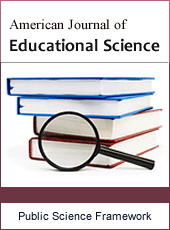American Journal of Educational Science
Articles Information
American Journal of Educational Science, Vol.4, No.1, Mar. 2018, Pub. Date: Jun. 6, 2018
The Effect of Mind Mapping vs Traditional Handout on the Understanding of a Topic Among Medical Students – A Randomized Controlled Trial
Pages: 1-7 Views: 2212 Downloads: 563
[01]
Kalaimathy Maniam, Faculty of Medicine, Melaka-Manipal Medical College, Melaka, Malaysia.
[02]
Nor Robaayah Meor Ahmad, Faculty of Medicine, Melaka-Manipal Medical College, Melaka, Malaysia.
[03]
Mahavithya Gandhi, Faculty of Medicine, Melaka-Manipal Medical College, Melaka, Malaysia.
[04]
Arunkumar Gunasingam, Faculty of Medicine, Melaka-Manipal Medical College, Melaka, Malaysia.
[05]
Mohamad Syahmi Bin Mohamad Amin, Faculty of Medicine, Melaka-Manipal Medical College, Melaka, Malaysia.
Handouts are a linear and structured way of note taking that has been used for centuries as a method of studying but it is not known to stimulate the creativity of the students whereas mind maps are an innovative way and non-structured form of note taking devised to stimulate students creativity and thought processes. Mind maps are a very popular way of studying and it has been used throughout the ages for learning, brainstorming, visualization of ideas and problem solving by educators, students and most professionals. Previous studies had been done regarding the effectiveness of mind maps on students’ understanding of a topic but very little study has been done where they compared the effectiveness of both methods against each other. This study aims to study the effects of mind mapping vs traditional handouts on understanding of a topic among medical students. Our study hypothesis states that there is a difference in the understanding of a topic between students who are using either mind maps or handouts. A randomized controlled trial study was conducted among medical students (n=60) in Muar, Johor, Malaysia. The traditional handout had 30 students and the mind map group had 30 students where both the interventions had similar information of Vitiligo. The participants were assessed through a self-administered questionnaire that consists of four sections. The knowledge scores is the primary outcome variable and the results were compared between the groups among the other outcomes in the feedback section. The mean knowledge percentage of mind map group was higher than handout group but it was not significant. Mind map had higher significant median value regarding interesting to read, useful to recall information, had better organization of thoughts and good for understanding the concepts and thoughts of the topic compared to handout group. In conclusion, mind map is an effective method in remembering and understanding a topic compared to reading a handout. Based on our study, the mind map group obtained a higher knowledge percentage than the handout group. It was found that the participants prefer to use the mind map method more compared to the handout method and it is also more convenient.
Mind Map, Handouts, Experimental Study, Randomized Control Trial
[01]
Tony Buzan | Learn from the Inventor of Mind Mapping. (n.d.). Retrieved February 24, 2018, from http://www.tonybuzan.com/
[02]
Kalyanasundaram, M., Abraham, S. B., Ramachandran, D., Jayaseelan, V., Bazroy, J., Singh, Z., & Purty, A. J. (2017). Effectiveness of Mind Mapping Technique in Information Retrieval Among Medical College Students in Puducherry-A Pilot Study. Retrieved February 24, 2018, from https://www.ncbi.nlm.nih.gov/pmc/articles/PMC5348998/#!po=22.0588
[03]
Farrand, P., Hussain, F., & Hennessy, E. (2002, May). The efficacy of the 'mind map' study technique. Retrieved February 24, 2018, from https://www.ncbi.nlm.nih.gov/pubmed/12028392
[04]
D'Antoni, A. V., Zipp, G. P., Olson, V. G., & Cahill, T. F. (2010). Does the mind map learning strategy facilitate information retrieval and critical thinking in medical students? Retrieved February 24, 2018, from https://www.ncbi.nlm.nih.gov/pmc/articles/PMC2949690/?report=reader
[05]
Melaka Manipal Medical College, Manipal. (n.d.). Retrieved March 14, 2018, from https://manipal.edu/mmmc-manipal/programs/program-list/mbbs-graduation-in-medicine.html
[06]
Reza Haghverdi, Hamid & Biria, Reza & Karimi, Lotfollah. (2010). Note-taking Strategies and Academic Achievement. Journal of Language and Linguistic Studies. 6.
[07]
Essays, UK. (November 2013). The Different Factors Affecting Students Academic Performance Education Essay. Retrieved on February 24, 2018, from https://www.ukessays.com/essays/education/the-different-factors-affecting-students-academic-performance-education-essay.php?cref=1
[08]
Ali, S., Haider, Z., Munir, F., Khan, H., & Ahmed, A. (2017, August 14). Factors Contributing to the Students Academic Performance: A Case Study of Islamia University Sub-Campus. Retrieved February 24, 2018, from http://pubs.sciepub.com/education/1/8/3/
[09]
Kusurkar, R., Ten Cate, T., Vos, C., Westers, P. and Croiset, G. (2018). How motivation affects academic performance: a structural equation modelling analysis. Springerlink.com. Retrieved on March 14, 108, from http://selfdeterminationtheory.org/SDT/documents/2012_KusurkarEtAl_AdvInHealthSciEdu.pdf
[10]
Hassanbeigi, A., Askari, J., Nakhjavanic, M., Shirkhodad, S., Barzegar, K., Mozayyan, M. and Fallahzadeh, H. (2018). The relationship between study skills and academic performance of university students. [online] Available at: https://ac.els-cdn.com/S187704281102101X/1-s2.0-S187704281102101X-main.pdf?_tid=d78940c4-ae14-4162-8641-350cef728837&acdnat=1521008760_473e74dc5d0fd9742c32424ffd89bf66 [Accessed 14 Mar. 2018].
[11]
Wickramasinghe, Amila & Widanapathirana, Nimali & Kuruppu, Osuka & Liyanage, Isurujith & Karunathilake, Indika. (2011). Effectiveness of mind maps as a learning tool for medical students. South East Asian J Med Educ. 1.
[12]
Daley BJ, Shaw CR, Balistrieri T, Glasenapp K, Piacentine L. Concept maps: a strategy to teach and evaluate critical thinking. The Journal of nursing education. https://www.ncbi.nlm.nih.gov/pubmed/9921788. Published January 1999. Accessed February 24, 2018.
[13]
Novak JD, Gowin DB. Learning How to Learn. Cambridge, England: Cambridge University Press; 1984.
[14]
McDermott P, Clarke DN. Mind Maps in Medicine. Edinburgh, UK: Churchill Livingstone; 1998.
[15]
Srinivasan M, McElvany M, Shay JM, Shavelson RJ, West DC. Measuring knowledge structure: reliability of concept mapping assessment in medical education. Academic medicine: journal of the Association of American Medical Colleges. https://www.ncbi.nlm.nih.gov/pubmed/19202500. Published December 2008. Accessed February 24, 2018.

ISSN Print: 2381-7127
ISSN Online: 2381-7135
Current Issue:
Vol. 6, Issue 2, June Submit a Manuscript Join Editorial Board Join Reviewer Team
ISSN Online: 2381-7135
Current Issue:
Vol. 6, Issue 2, June Submit a Manuscript Join Editorial Board Join Reviewer Team
| About This Journal |
| All Issues |
| Open Access |
| Indexing |
| Payment Information |
| Author Guidelines |
| Review Process |
| Publication Ethics |
| Editorial Board |
| Peer Reviewers |


